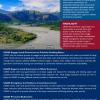A tale of water scarcity and community resilience
“No more migration for water!” said Dambar BC, the Turmkhand Rural Municipality chairperson. Until recently, more than 20 households from Bijulekh village migrated annually due to water scarcity.
Now, the villagers have access to fresh, clean water thanks to the installation of a new solar-lift Water Supply and Sanitation system supported by the USAID Karnali Water activity and managed by the Water Users and Sanitation Committee. The WSS uses solar-powered pumps to transport water from the river to local reservoirs and pump that water throughout the village. Solar power is environmentally friendly and cost-effective for communities.
“It's like a blessing,” said Golma Devi Buda Chhetri, a 57-year-old resident who has been dealing with water scarcity for more than four decades.
“This year, not a single family had to leave,” said Jogiram Buda Chhetri, Golma’s husband. It brought stability to our lives.” The water system eliminates the need for migration and brings a sense of development, according to Bijulekh resident Pabrita Budha, a 17-year-old.
“It feels like a dream. We never thought all the households would have tap connections,” said Pabrita. The new solar lift water supply scheme allows the villagers to remain in Bijulekh year-round and eliminates the need to spend hours each day fetching open-source water.
“I also remember the past, where we used to trek for water with torchlight during the nighttime,” said Prapiti Budha. Before the WSS was installed, villagers fetched water five or six times a day, each taking three hours round trip.
The convenience shifted the community's focus from water fetching to kitchen gardening and waste-water management, improving livelihoods and allowing children to reach school on time.
“We utilize water from the scheme to cultivate onion, garlic, spinach, potatoes and tomatoes in our garden,” said Nayaram BC, a local farmer, who helped with construction.
As a member of the water users committee, he used his masonry, pipefitting and construction skills to support the project. “It was hard work but it was all worth it for the access to safe drinking water at our doorsteps,” he said.
The Bijulekh solar-lifting WSS scheme, backed by the USAID Karnali Water activity under the leadership of the Turmakhand Rural Municipality and managed by the local water users and sanitation committee, has improved the lives of 230 people from 39 families. The facility lifts water more than 400 meters high and brings it to the doorstep of every household in Bijulekh.
The USAID Karnali Water Activity team worked with local government authorities to leverage funds and developed policies and regulations such as a municipal Water Sanitation and Hygiene (WASH) bill and a water users master plan for broader coverage.
The community contributed leadership and in-kind contributions, digging the canal, transporting construction materials, pipefitting, etc. To ensure the success of the water plant, the community contributed 16 percent of the cost, and the municipality covered 40 percent, amounting to nearly $96,000, for completing the project with support from the USAID Karnali Water Activity. This highlights the local government and community's strong sense of ownership and commitment.
By December 2023, the USAID Karnali Water Activity had helped 64 communities across the Karnali river basin, reaching more than 12,000 people and ensuring sustainable, improved drinking water facilities at their doorsteps.

USAID Karnali Water (2024)

